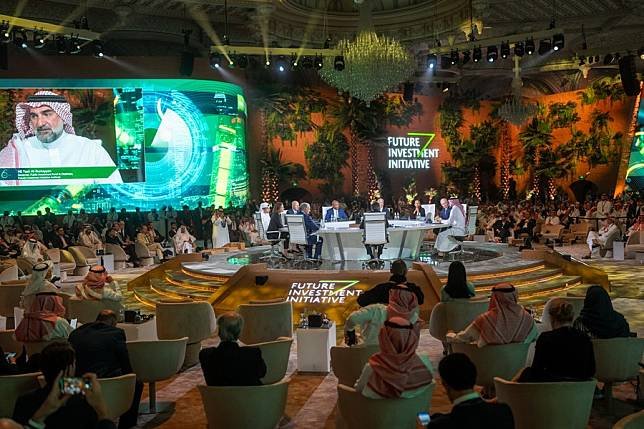Pilgrims To The Desert: VC Is Awash in Middle East Money But Some Strings Are Attached
“Islamic investors are sophisticated people who know the market, know where the spreads are. It is a misconception that it is easy to get money from there."
- Arul Kandasamy, Head of Islamic Financing Solutions, Barclays Capital.
The venture capital world has seen a surge of new money coming from an unlikely source over the past couple years - the oil-rich nations of the Middle East. Sovereign wealth funds, family offices and other investors from countries like Saudi Arabia, the United Arab Emirates, Qatar and Kuwait have been ramping up their allocations to venture capital funds at an unprecedented rate.
Just a few years ago, LP commitments from Middle Eastern investors were fairly modest across the VC asset class. While they had been investing in private equity for some time, their appetite for the higher-risk, higher-return potential of VC remained relatively small. However, this has changed dramatically beginning in 2020.
Driven by a recognition that their economies need to diversify beyond oil and gas, as well as a desire to get in on the ground floor of transformative technologies, Middle Eastern LPs have become some of the most active investors in top-tier VC funds globally. Estimates vary, but industry data suggests their overall capital commitments to VC funds have increased by 5-10x or more compared to just a few years ago.
The largest source has been Saudi Arabia's massive Private Investment Fund (PIF) and its many offshoots (e.g. Sanabil, GIB Capital, SEVEN, etc.), which collectively manage over $600 billion in assets. PIF has announced plans to deploy $50+ billion into VC, making them potentially the single largest VC LP in the world. They have taken sizeable stakes in companies such as Uber and funds including Japanese tech conglomerate SoftBank.
Other major players include the UAE's Mubadala Investment Company, Qatar Investment Authority (QIA), and Kuwait Investment Authority (KIA). Mubadala recently committed $250 million to Insight Partners' current fund, QIA put $400 million into General Atlantic's latest vehicle. Not to be left out, KIA has increased its exposure to brand name firms like Sequoia and Andreessen Horowitz.
“We’re talking today about how the world order is changing, and how the region is becoming an important region. It’s very classic. It’s a renaissance state.”
- Ray Dalio, Founder, Bridgewater Associates
The Middle Eastern sovereigns tend to favor making concentrated bets with established managers and firms they have existing relationships with. However, they and the region’s many family offices are increasingly exploring opportunities with new, emerging fund managers, especially those focused on growth areas like AI, fintech, cybersecurity, logistics and mobility.
Securing an investment from these LPs is no easy feat, however. Consistent with the cultural norms of the region, building long-term relationships and trust is paramount. Over the past 18 months I have made 7 trips to the Middle East, spending significant time on the ground in multiple meetings and becoming entrenched in the local ecosystems. I can tell you those who started their relationship building 18 months or more ago are much better positioned to capitalize on Middle East investor momentum.
For managers just now looking to tap into the Middle East LP stream, the path is trickier. An increasing “in-region” focus has Middle East investors requiring that fund managers “give back” to the region. With institutions like PIF, Mubadala, QIA as well as family offices such as Olayan, DAMAC and others being inundated with opportunities, fund managers without existing relationships face an almost impossible battle obtaining introductory meetings, let alone getting mindshare or capital commitments.
Even if you’re fortunate enough to get a capital commitment for your fund, it's not just a one-way cash flow. As noted above, in exchange for their capital commitments, Middle Eastern LPs are increasingly asking - or even requiring - venture funds to give back to their local economies in some form. This could take several shapes, including knowledge transfer initiatives, direct investments into startups based in the Middle East, or even establishing a physical office presence locally.
For instance, Saudi Arabia's PIF has made it a stipulation that VC fund managers who receive capital from them must invest directly into Saudi startups or hire and train local talent. They see their VC investment program not just a way to generate returns, but as a key part of their Vision 2030 agenda to diversify the Saudi economy away from oil dependence.
Similarly, Mubadala and other UAE funds are aiming to leverage their VC fund commitments to attract expertise and investment that develops their local tech/startup landscape. They're asking top VC brands to take part in training programs, policy development, and other ecosystem-building initiatives in places like Abu Dhabi and Dubai.
An early believer in the Middle East investor and startup eco-system, WestRiver Group is proud to have been asked to bring its expertise to the region and advise both local family offices and large government sponsored entities on their alternative investment strategies, underwriting polices, portfolio construction and company building. We view the Middle East as a logical part of our firm’s expansion and have demonstrated our commitment to the region and its startup diaspora over the past few years. Look for WestRiver offices in Dubai and Riyadh in the not-too-distant future.
Overall, the Middle East money flood into venture is spurring the growth and connectivity of startup ecosystems across the Gulf states. As these nations double down on using VC as a catalyst for economic transformation, VC funds are being pulled into these efforts in exchange for tapping into prolific capital streams. It's an increasingly intertwined relationship between two parties accelerating the evolution of the VC world order and growth of the global innovation economy.
#ONWARD
